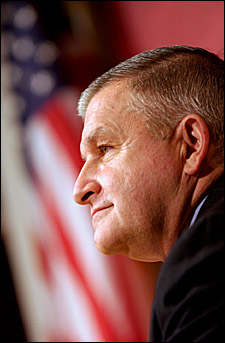Zinni describes ‘way forward’
Former head of Central Command speaks at JFK forum
Resuming the peace process between Israel and the Palestinians is the single most important step the United States can take to regain its stature in the world, Gen. Anthony Zinni told a packed house Dec. 8 at the John F. Kennedy Jr. Forum.

Zinni, a retired Marine Corps general and former head of U.S. Central Command (1997-2000) who also served as a peace envoy to the Middle East, has been an outspoken critic of the war in Iraq and the Bush administration’s Middle East policy. He laid out his own prescription for a “way forward” in dealing with the region’s problems.
“The United States needs to be fully committed and engaged in the peace process,” Zinni asserted. He noted that Israel’s plan to dismantle its settlements in the Gaza presents “a golden opportunity” to establish a model state that will create stability and prosperity for the Palestinian people. The new Palestinian leaders, he added, “can negotiate peace, and are willing and desirous.” What the United States must avoid is repeating prior mistakes, like assigning high-profile special envoys to the task.
“They are too touch-and-go, and their personalities become a lightning rod for the issues,” he said. “We need to involve professional negotiators and leave the high-profile people out.” He added that the process should unfold in steps “rather than one overall tremendous agreement” that would risk being perceived by the Palestinians “as another poison apple.”
The United States must also approach the war on terror more strategically, Zinni asserted.
“Tactically, we’re doing well against al-Qaida,” he said. “Strategically, we’re not doing so good. We need to do more prevention and up-front work” to address the root causes of terror, he continued. Better education, economic development, political and social reform, and capacity building in the region will quell the rise of radical separatist movements and the “continuous flow of angry young men willing to blow themselves up.”
Zinni also stressed the “need for an open…dialogue” among Muslims “to challenge and discuss” the role of Islam in the 21st century so that extremist movements do not destroy the prospects of peace in the Islamic world.
“When I was at Centcom [U.S. Central Command] we believed there were three reasons why we cared about the region: the flow of energy, keeping access open, and our allies,” Zinni said. Having spent 15 years in the Middle East, he came to understand a fourth reason: “the people.” He mentioned a recent Zogby poll of attitudes and values of both the Arab world and of Americans. “Our values and concerns are the same,” Zinni noted.
The United States has an obligation to help the Middle East “come into the 21st century. There is enough right and wrong on both sides. It’s time to put the past behind and ask, ‘What future do you want for your children?’ We will be judged by history as to our contribution to this region.”
Zinni’s address was sponsored by the Kennedy School’s Belfer Center for Science and International Affairs.




